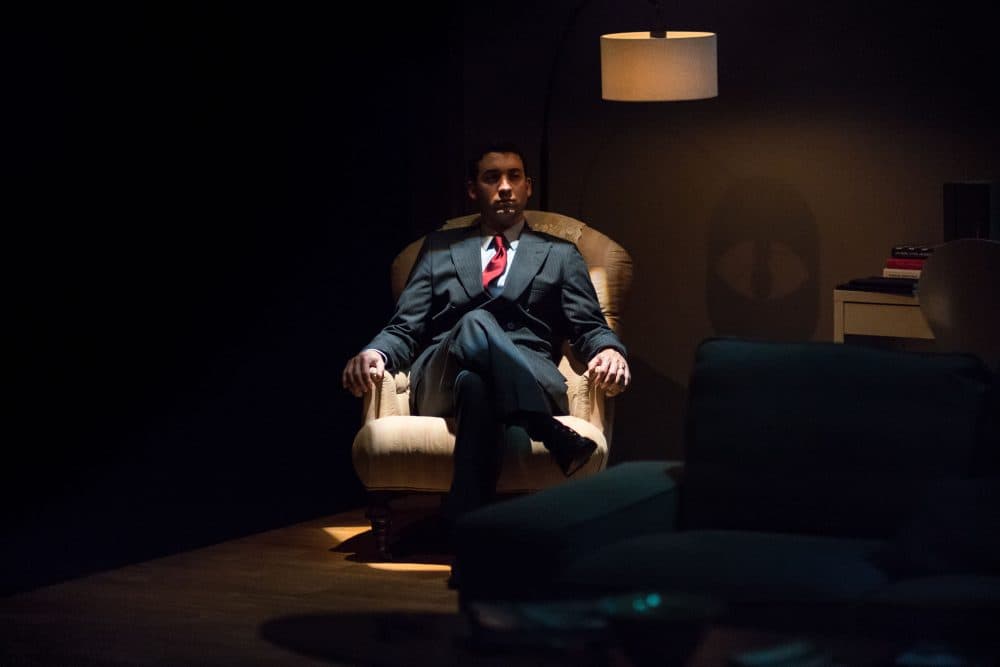Advertisement
I Forgot To Remember To Forget — Nora Theatre's 'Marjorie Prime' Explores Memory And Self

If life is an ever-evolving moment of “now,” then what exactly are memories? Where inside us do they live? And what good are they?
Most of us think of memories as almost physical imprints of personal history; or, as a character in Jordan Harrison’s “Marjorie Prime” has it, “sedimentary layers in the brain” that can be reliably excavated with the tools of patience and time. They are such stuff as our worldview is built on.
The latest science about the creation of memory presents a more liberating but also more unsettling view. Memories, it’s now thought, are not clumps of data stowed away in our brains but more like abridged cues that we essentially recreate and re-embellish each time we access them. And so researchers have successfully “implanted” false memories in test subjects who learn to “remember” the fine details of events that never actually occurred.
To refashion Descartes’ immortal formulation: I remember, therefore I am. But if I remember events differently from how they actually occurred, what exactly am I?

Harrison’s quiet and literary play, which the Nora Theatre Company is presenting in a thoughtful production at Central Square Theater through Oct. 9, is concerned with questions like these. (The play was a Pulitzer Prize finalist last year.) But its success lies in the very believable and relatable family dynamics expressed by a very good cast of four, under the clear-eyed direction of M. Bevin O’Gara. “Marjorie Prime” turns on a science fiction conceit — an elderly woman is provided a robot embodiment of her husband for companionship and to serve as a memory aid — and thus feels topical, concerned with artificial intelligence and questions about technology, et cetera.
Yet at heart it’s a rather traditional American family drama, complete with a bombshell or two about past trauma. To its credit though, its sometimes-tearful revelations aren’t there merely to provoke an emotional response from the audience. They fold ingenuously back into the playwright’s theme, and leave you with plenty to talk — and think — about long after the curtain falls.
Sarah deLima is Marjorie, a woman whose failing health and faltering memory have landed her in the care of her daughter Tess (a terrific Lee Mikeska Gardner) and son-in-law Jon (Barlow Adamson, also in strong form). She’s kept company by Walter — well, Walter Prime, a robot embodiment of her late husband. By some unexplained process, purchasers of these human facsimiles receive a version of their chosen companion that is thought to best suit them. For Marjorie, it’s her husband as he appeared in his early 30s. This match feels creepy to Tess, but moreover, it implies awkward notions about what period, exactly, was the prime of her mother’s life.

In the exchanges between human and robot, we gradually learn details of the family’s mythology, and instances where the family story seems to have been amended. Jon urges Tess to let her mother shed her more painful memories, and take comfort in a few well-chosen historical revisions. Marjorie is somewhat happier and less sarcastic, but this version of her mother feels less authentic to Tess. When pain does much to define you, is it dishonest to shed some of it near the end?
Alejandro Simoes ably plays the rather thankless role of Walter. Unlike the similarly human-looking robots in Michael West’s “The Chinese Room,” seen in a fully grossing world premiere at Williamstown Theatre Festival this summer, Walter doesn’t go haywire or have any humorous bits, and his presentation of humanness doesn’t make us ask uncomfortable questions about agency and soul and our responsibility to things we create. Instead, he’s just there, meant to seem stiff but not too stiff, comfortable but not too comfortable.
The dramatic fireworks, such as they are, come from the finely tuned husband-and-wife interplay of Gardner’s Tess and Adamson’s Jon; one scene between the two in the late going, when Tess is suffering from debilitating depression, is like a little symphony. Marjorie is proud and aloof but no longer quite as willful as she’d prefer to be; deLima plays her struggles with memory not for pathos but with a resigned acceptance. The British-born actor gives Marjorie an unexplained English accent; this is mildly distracting but also slyly underlines her emotional distance from her daughter.

Surprises drive the story, and most of the actors play dual roles, of a fashion. (Lets hope we see Gardner, the Nora’s artistic director, onstage here more frequently in the future.) Sara Brown’s well-detailed set places the action in its upper-middle-class milieu. The play does seem to back out a little anticlimactically. But an admirably awkward concluding scene, which plays more like an epilogue, finally leaves us wondering: How precious, really, are our most precious memories?
